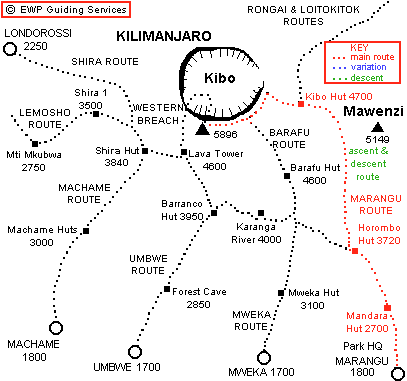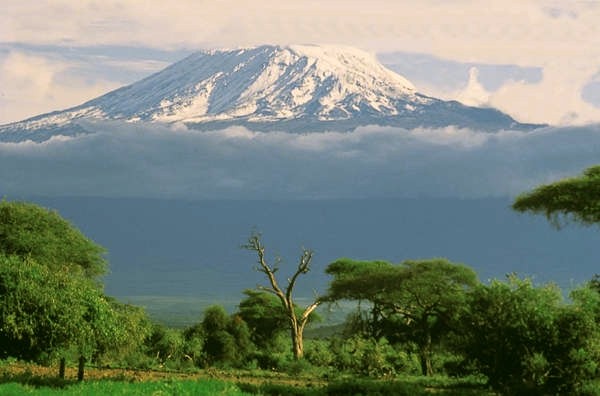Post by Peter Bakwin on Nov 11, 2009 21:07:06 GMT -5
Karl Egloff has the ascent (4h56m) and round trip record 6h42m24s via the Umbwe Route, August 13, 2014.
Previous: Kilian Jornet had the ascent (5h23m50s) and round trip (7h14m) records, set September 2010.
Fernanda Maciel has the women's ascent (7h8m) and round trip (10h6m) FKT via the Umbwe Route, September 2017.
Kilimanjaro (19,341') is the highest peak in Africa, and the largest volcano in the world. Nevertheless, the hike to the summit is technically quite easy, really just a trail hike. The peak is a major tourist attraction, attempted by thousands every year. Most take the long (23 miles one way?) and well-groomed Marangu Route (aka "Coca-cola Route"), but there are numerous other routes on the mountain.
Speed records on the world's big peaks, including Kili, have been frought with accusations of fraud. Many of the players have a financial stake in a high-profile speed record. Generally, it is easier to cast doubt on someone's accomplishments than to actually set up a solid verification system for your own trip. It depends on how important it is to you that others believe what you say you have done.
The logistics of a fast trip on Kili are difficult. The mountain is in Tanzania's Kilimanjaro National Park. We were told by a Tanzanian guide who lives part-time in the US that "The park authority... [does] not allow any adventure activities" (meaning, speed climbs). However, this conflicts with what we were told by an employee of the park authority immediately following our climb of the peak in January 2007. The Tanzanian guide, who frequently leads trips on Kilimanjaro, also told us that the minimum fee just for the permit would be $642 per person, which is more than we ended up paying for our entire trip booked with Zara through Adventures Within Reach. As usual in the Third World, accurate information is nearly impossible to come by.
Official rules appear to be that all climbers must be accompanied by a guide, who is required to carry supplemental oxygen. There are check points along the way, and unaccompanied climbers may well be stopped, as we were when we tried to leave Kibo Hut (15,500') without our guide, who had fallen behind by over 90 minutes. Convincing a guiding service that you want to climb, and are capable of climbing, the peak in less than the standard 5-6 day trip can be difficult. In any event, once on the trail you are basically at the mercy of your guide. Also complicating matters for a fast trip, entry into the park it not allowed before the 6:00 a.m. (or however long after that time you are able to get checked in with the park authority.) If you want to just show up and climb Kili, as we did, it can be quite difficult to negotiate, and remarkably expensive in a country where the average wage is just a few hundred dollars per year.
Team Kilimanjaro appears to set up trips specifically for speed climbing. They claim several speed records on the mountain have been set by their guides and clients.
Spanish mountain runner Kilian Jornet crushed all previous ascent and round trip records in September 2010. Jornet ascended via the Umbwe Route in 5h23m50s and descended via the Mweka Route, completing the round trip in 7h14m. We consider this highly reliable. Jornet has been the top mountain runner in the world for the last few years, with an amazing race and adventure resume (and peerless VO2max). His Kili trip is reported in French on this blog, which has been translated to English here.
Four years after Jornet (August 13, 2014), Karl Egloff set the round trip speed record of 6h42m24s (4h56m ascent) via the Umbwe & Mweka Routes (as did Jornet), as reported here. Egloff has worked as a guide on Kilimanjaro and elsewhere. A detailed interview with Egloff is on Ian Corliss' "Talk Ultra" podcast (the interview begins about 28 min. into the podcast). The interview includes discussion of verification.
Prior to Jornet, Sean Burch claimed the speed record for the ascent of Kilimanjaro, 5h28m58s on June 7, 2005, via the Marangu Route. This record has been questioned by Team Kilimanjaro, who had (prior to Jornet) credited the legendary Italian mountain runner Bruno Brunod with the ascent record of 5h38m40s, set November 22, 2001, also via the Marangu. Brunod descended in 2h56m12s, for a round-trip time of 8h34m52s.
Christian Stangl claims an ascent time of 5h36m38s -- that is 2m faster than Brunod's time -- set on Oct. 12, 2004, as part of the Seven Summits Speed Project. Stangl ascended via the Umbwe route, which is shorter and steeper than the Marangu. His round-trip time is reported as 8h49m3s, but it is not clear which route was used for the descent.
Tanzanian ultrarunner Simon Mtuy claimed the overall round-trip record of 8h27m, on December 26, 2004, ascending via the shorter Umbwe Route and descending via the Mweka Route. Note that Mtuy's ascent was through the Western Breach, which was closed for a couple of years due to a rock slide, but apparently reopened in January 2008.
Fernanda Maciel set the women's FKT in September 2017 via the Umbwe route. Her ascent time was 7h8m, and she descended to the Mweka Gate for a round-trip time of 10h6m. Maciel's effort bested the 2015 time of Anne-Marie Flammersfeld, who did the same route in 12h58m (8h32m for the ascent). Prior to Flammersfeld, the FKT was by
Zimbabwean Debbie Bachmann with the ascent (11h51m) and round-trip (18h31), set in 2011. Still earlier, Rebecca Rees-Evans of the United Kingdom held the female ascent record of 13h16m37s on May 21, 2005, via Marangu.
Previous: Kilian Jornet had the ascent (5h23m50s) and round trip (7h14m) records, set September 2010.
Fernanda Maciel has the women's ascent (7h8m) and round trip (10h6m) FKT via the Umbwe Route, September 2017.
Kilimanjaro (19,341') is the highest peak in Africa, and the largest volcano in the world. Nevertheless, the hike to the summit is technically quite easy, really just a trail hike. The peak is a major tourist attraction, attempted by thousands every year. Most take the long (23 miles one way?) and well-groomed Marangu Route (aka "Coca-cola Route"), but there are numerous other routes on the mountain.
Speed records on the world's big peaks, including Kili, have been frought with accusations of fraud. Many of the players have a financial stake in a high-profile speed record. Generally, it is easier to cast doubt on someone's accomplishments than to actually set up a solid verification system for your own trip. It depends on how important it is to you that others believe what you say you have done.
The logistics of a fast trip on Kili are difficult. The mountain is in Tanzania's Kilimanjaro National Park. We were told by a Tanzanian guide who lives part-time in the US that "The park authority... [does] not allow any adventure activities" (meaning, speed climbs). However, this conflicts with what we were told by an employee of the park authority immediately following our climb of the peak in January 2007. The Tanzanian guide, who frequently leads trips on Kilimanjaro, also told us that the minimum fee just for the permit would be $642 per person, which is more than we ended up paying for our entire trip booked with Zara through Adventures Within Reach. As usual in the Third World, accurate information is nearly impossible to come by.
Official rules appear to be that all climbers must be accompanied by a guide, who is required to carry supplemental oxygen. There are check points along the way, and unaccompanied climbers may well be stopped, as we were when we tried to leave Kibo Hut (15,500') without our guide, who had fallen behind by over 90 minutes. Convincing a guiding service that you want to climb, and are capable of climbing, the peak in less than the standard 5-6 day trip can be difficult. In any event, once on the trail you are basically at the mercy of your guide. Also complicating matters for a fast trip, entry into the park it not allowed before the 6:00 a.m. (or however long after that time you are able to get checked in with the park authority.) If you want to just show up and climb Kili, as we did, it can be quite difficult to negotiate, and remarkably expensive in a country where the average wage is just a few hundred dollars per year.
Team Kilimanjaro appears to set up trips specifically for speed climbing. They claim several speed records on the mountain have been set by their guides and clients.
Spanish mountain runner Kilian Jornet crushed all previous ascent and round trip records in September 2010. Jornet ascended via the Umbwe Route in 5h23m50s and descended via the Mweka Route, completing the round trip in 7h14m. We consider this highly reliable. Jornet has been the top mountain runner in the world for the last few years, with an amazing race and adventure resume (and peerless VO2max). His Kili trip is reported in French on this blog, which has been translated to English here.
Four years after Jornet (August 13, 2014), Karl Egloff set the round trip speed record of 6h42m24s (4h56m ascent) via the Umbwe & Mweka Routes (as did Jornet), as reported here. Egloff has worked as a guide on Kilimanjaro and elsewhere. A detailed interview with Egloff is on Ian Corliss' "Talk Ultra" podcast (the interview begins about 28 min. into the podcast). The interview includes discussion of verification.
Prior to Jornet, Sean Burch claimed the speed record for the ascent of Kilimanjaro, 5h28m58s on June 7, 2005, via the Marangu Route. This record has been questioned by Team Kilimanjaro, who had (prior to Jornet) credited the legendary Italian mountain runner Bruno Brunod with the ascent record of 5h38m40s, set November 22, 2001, also via the Marangu. Brunod descended in 2h56m12s, for a round-trip time of 8h34m52s.
Christian Stangl claims an ascent time of 5h36m38s -- that is 2m faster than Brunod's time -- set on Oct. 12, 2004, as part of the Seven Summits Speed Project. Stangl ascended via the Umbwe route, which is shorter and steeper than the Marangu. His round-trip time is reported as 8h49m3s, but it is not clear which route was used for the descent.
Tanzanian ultrarunner Simon Mtuy claimed the overall round-trip record of 8h27m, on December 26, 2004, ascending via the shorter Umbwe Route and descending via the Mweka Route. Note that Mtuy's ascent was through the Western Breach, which was closed for a couple of years due to a rock slide, but apparently reopened in January 2008.
Fernanda Maciel set the women's FKT in September 2017 via the Umbwe route. Her ascent time was 7h8m, and she descended to the Mweka Gate for a round-trip time of 10h6m. Maciel's effort bested the 2015 time of Anne-Marie Flammersfeld, who did the same route in 12h58m (8h32m for the ascent). Prior to Flammersfeld, the FKT was by
Zimbabwean Debbie Bachmann with the ascent (11h51m) and round-trip (18h31), set in 2011. Still earlier, Rebecca Rees-Evans of the United Kingdom held the female ascent record of 13h16m37s on May 21, 2005, via Marangu.
 |  |





